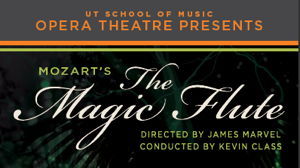
(CMarlowe Photography)
Without doubt, the very things that make Mozart’s The Magic Flute (Die Zauberflöte) compelling theatre are also the things that can become mind-boggling difficulties in modern productions. Its allegorical themes of enlightenment vs. ignorance, and the basic good vs. evil theme, are products of the Masonic allusions that Mozart and his librettist, Emanuel Schikaneder, wove into the fabric of the work. The work virtually drips with symbolism, both visual and literal, while sporting other themes concerning the obtaining of wisdom and knowledge and the celebration of virtue. The plot also features bawdy comedy, theatrical effects, and spoken dialogue with the result often being an overwhelming and seemingly conflicted concoction, albeit blessed with great music.
How, then, does one succeed with The Magic Flute in a School of Music production in 2015? If you do as the University of Tennessee Opera Theatre did in their performances this last weekend at the Bijou—you simplify. UTOT certainly proved that simpler can be both beautiful and magical.
UTOT stage director James Marvel and music director/conductor Kevin Class made some very judicious decisions in music and dialogue cuts that gave the undertaking a cohesive briskness that would have been the envy of many fully professional productions. Tying this tight production together visually was a simple, but extremely effective, set consisting of a platform and steps with an intriguing background drop made endlessly variable via lighting.
As is the UTOT custom, this production was double-cast over the four performances for the reasons of giving performance opportunities to as many singers as possible. As Marvel indicated in his preview material—and confirmed by the performances—the two casts offered a nicely balanced showcase for the graduate and undergraduate singers that called for different levels of comic ability, dramatic range, stage presence, and vocal quality.
A particularly interesting casting situation was in the tenor role of Tamino, taken by Todd Barnhill and Mattia D’Affuso. Barnhill’s clean tenor strength and stage warmth made his Tamino an extremely likable and sympathetic lead. [Note: Barnhill was a Middle/East Tennessee district winner in the 2015 Met Opera auditions.] D’Affuso, it should be noted, was making the transition from baritone to tenor with this production—and his rich depth, voice color, and range certainly leads to speculation that he is considering pursuing heldentenor roles in the future.
Opposite the role of Tamino is the princess Pamina, sung in this production by sopranos Emily Hagens and Caitlin Thomas. Each had beautiful vocal strength and lyrical lushness in the part; dramatically, Hagens’ offered a Pamina that was deliciously complex and entertaining; Thomas offered up the quintessential fairytale princess, somewhat submissive, seemingly at the mercy of higher forces.
The role of the bird-catcher, Papageno, written for Mozart’s librettist/impresario Emanuel Schikaneder, was taken by two singers with solid comic potential, Thaddeus Ennen and Makoto Winkler. Ennen’s Papageno was the perfect dramatic combination of stage presence and comic silliness, backed up with a rich and enjoyable vocal performance. Winkler offered a bird-catcher that was a bit more frenetic and goofy, but with a really gorgeous baritone.
The role of the Queen of the Night is one of the opera’s most baffling roles and a difficult one to cast … and to portray. The Act II aria “Der Hölle Rache kocht in meinem Herzen” has a range of two octaves extending to a high F and requires the singer to sell angry rage while pressing Pamina to murder her rival Sarastro. Fortunately, UTOT had two sopranos up to the task: Aimee Allen and Alexandria Shiner. Both singers, aided by spiky headdresses and a sumptuous atmosphere of stars, had perfected the required contrast between the Queen’s disingenuous lament in her Act I aria and the raw vengeance of her Act II appearance. Shiner’s portrayal went a step further, though, with a gorgeous coloratura, amazing depth and power, and a stunningly vivid dramatic portrayal.
In the role of Papagena, Papageno’s romantic match, were two singer/actresses who presented energy and comic flare, with delightful vocal performances to match. Maxwell Porterfield and Noelle Harb each gave their Papagena twists of personality while skillfully walking that fine line between comedy and campiness.
In the role of Sarastro were two strong basses, James Eder and Brent Hetherington—each brought the appropriate and deliberate dignity. The role of Monostatos, a difficult one for modern audiences due to its depictions of good vs. evil, was delivered with remarkable attractiveness by Taylor Cotton Stone and Breyon Ewing.
Things in “threes” play an important role in Mozart and Schikaneder’s Masonic references: three chords that begin the overture, three ‘Ladies’, three ‘Spirits’, not to mention the three flats of E-flat Major that predominates in the work. Singing the three Ladies were Lindsey Fusion, Andrea Markowitz, and Maggie Ramsey in one cast—Ryan Colbert, Kacie Kenton, and Melanie Burbules in the other. The three Spirits, portrayed by Marvel as sullen, punked-out boys, were sung by Haley Retterer, Claire Hoppen, and Taylor Greene—and by Megan Mayes, Chelsea Marlowe, and Taylor Greene in the second cast. Tyler Padgett and Jack Francis brought both seriousness and comic relief, nicely contemporized, to the two Armoured Men.
This was a production with an entertaining visual point of view, including costumes by Patti Rogers and lighting by John Horner.
Some string intonation issues marred an otherwise solid performance by the UT Opera Orchestra, under conductor Kevin Class. Happily, those lapses were more than made up for by some really admirable playing from the woodwinds, brass, and percussion, and by impressive control by Maestro Class.








